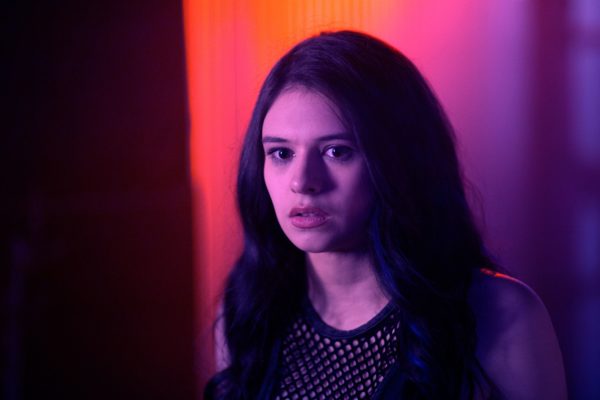
The most revolutionary aspect of Bit, writer/director Brad Michael Elmore’s unapologetically queer feminist vampire film, is the thing that goes unsaid.
There’s nothing inherently new about queer horror, though in recent years the representation of gay and lesbian sexualities has increasingly shifted from subtext to text as characters move from the periphery to the front. Noticeably absent in this revolution are trans characters, who remain marginalized and underrepresented.
Enter Bit, a film fronted not only by women, lesbians and POC characters, but also features a trans woman – Nicole Maines – as its lead actress. And it is so cooly confident that the word “trans” is never even used.
Laurel (Maines) is a sarcastic high school grad who casts off her small town gay bestie Andy (Matt Pierce) to visit her brother Mark (James Paxton) in Los Angeles. Almost immediately she catches the eye of Duke (Diana Hopper), the lesbian leader of an all-female troupe of vampires that includes Frog (Char Diaz), Roya (Friday Chamberlain), and Lizzy (Zolee Griggs). In short order, Lizzy seduces and then bites Laurel, who is saved from death by Duke.
The vampire leader clearly sees something of herself in the girl (an idea supported by a series of match-on edits by Elmore) and Laurel is eventually initiated into the pack when she helps thwart an attack by Enoch (M.C. Gainey), a human man with ties to “the Creator”, aka Vlad (Greg Hill).

Nicole Maines in Bit
Bit is clearly a post-modern take on The Lost Boys, albeit with a strong feminist twist. The vamps in the film don’t have fangs and they can walk in the sun, but like so many cinematic bloodsuckers, they’re effortlessly chic and cool (credit is due to Lisa Norcia for her rocker-infused costumes, particularly Duke’s covetable white leather jacket). Levitation, strength, and “glamour” abilities are all on the table, so long as the girls don’t break Duke’s rules:
- Never glamour another vampire to influence their decisions,
- Kill what you “eat” and, most importantly,
- Never turn a man
Obviously the rules will become a point of conflict in the film, which doesn’t take a great deal of narrative risks in its storytelling (a locked vault will obviously be opened; an emergency situation will compromise rule #3, etc), but this hardly matters. Bit‘s mixture of self-referential dialogue, its unabashedly pro-female messaging and, most significantly, its casual (read: politically astute and progressive) treatment of its trans lead are all big pros.
The film isn’t perfect, of course: at times Elmore’s dialogue tries a little too hard to be clever; his ambition is outweighed by his limited budget; and the pacing sags as the film lurches towards its relatively obvious climax. Overall, however, there’s too much good in Bit not to recommend.
This applies most readily to Maines, who burst onto the scene with a prominent role on The CW’s Supergirl, as well as Hopper, who despite her petite form, captures the essence of a vampire queen with her line delivery and her swagger. Despite a rocky opening scene where Hopper and Elmore’s dialogue appear incompatible, the actress solidly anchors one of the film’s most visually ambitious sequences as she explains to Laurel via extended flashback (set perfectly to Boney M’s ‘Rasputin’) how she overcame decades of indentured servitude to Vlad to become the group’s leader. It’s the perfect encapsulation of Bit‘s ambitiously progressive political message.
For women seeking a film that acknowledges the power hungry motives of men, for fans of punk rock vampires and, most significantly, for trans audiences eager for positive and engaging representation, Bit feels like a breath of fresh air.
Also: I want Laurel’s adorable hamburger necklace.
3.5/5
Frameline is the world’s longest-running and largest showcase of queer cinema. Frameline43, the San Francisco International LGBTQ+ Film Festival, takes place June 20-30, 2019 in San Francisco, Berkeley, and Oakland. This year’s slate includes 59 films screening for the first time in the US, including 22 world premieres, 8 international premieres, 12 North American premieres, and 17 US premieres. The lineup also contains a record-breaking 22 first narrative features. Find out more information here.